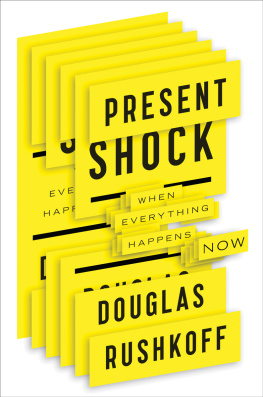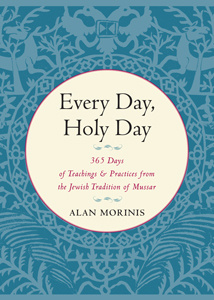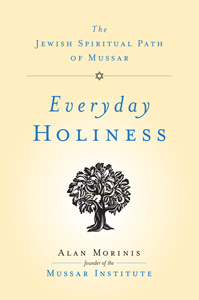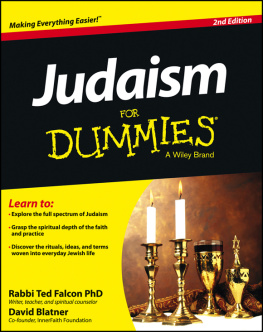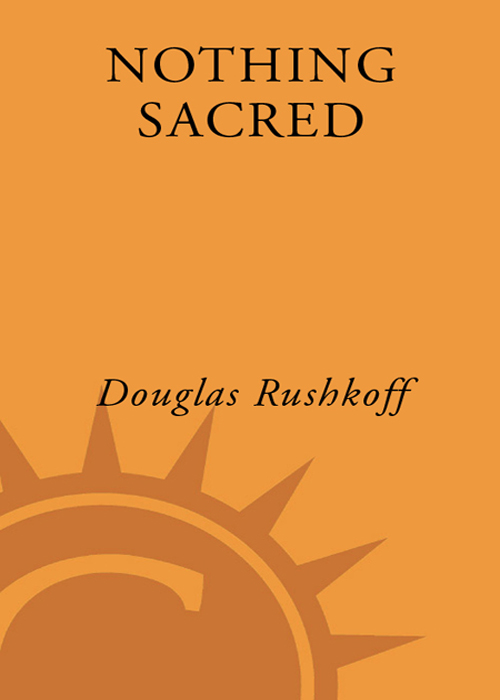
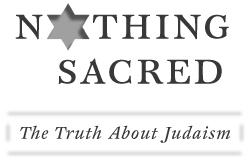
DOUGLAS RUSHKOFF
CROWN PUBLISHERS | NEW YORK
CONTENTS
For my wife, Barbara
Can we talk?
JOAN RIVERS
PREFACE
FOR MANY PEOPLE, crises like a global recession, terrorist threats to the United States, and the escalating war in the Middle East have been strong motivators to take a good hard look at the role of faith in their lives. The sudden realization that one's financial or even physical security is at risk is enough to send millions streaming into their houses of worship for a sense of comfort and meaning.
The urge to reexamine my own ties to faith came a few years earlier, however. Since the early nineties, I had made my living and found my meaning as a media theorist and social commentator. America's rush to embrace new media as our greatest hope for cultural and financial salvation cast me as something of an unwilling pundit. I may have had answers to some of the basic questions about how media impacts society and identitybut these were not always the answers that concerned parents, committed academics, or hopeful businesspeople wanted to hear.
So I decided to write books, make documentaries, and give lectures about the real promise of interactive technology: our new tools were turning media from a top-down affair into a participatory one. Instead of passively absorbing the stories of our television programmers, we were being empowered to write and share our own.
But while interactive devices from the remote control to the computer keyboard filled me with hope, they filled the keepers of the mainstream media with dread. People with Internet connections in their homes were watching less television. And the TV commercials they did watch were growing less effective. Television had lost its magic hold over families that owned camcorders and could make their own programs. Besides, kids were channel surfing away before the ads could even be played. Meanwhile, the Internet had spawned a community of people who were more interested in sharing their own ideas than buying them from the mainstream media. They were even writing their own software and then giving it away as shareware.
Mainstream media had lost our attention and wanted it back. Borrowing a term from 1970s social science, media business advocates declared that we were now living in an attention economy. They began to measure human time in quantities called eyeball hours and to create media sticky enough to engage those eyeballs and show them advertisements. They made computers easier to usebut for a much narrower range of purposes. Less sharing, more buying. Computers and the Internet, once an invitation to explore and interact, were now mysterious, complex, and entirely uninviting technologies for anything except direct marketing. On the Web, the only opportunity to type into a keyboard was to enter a credit card number. On a home computer, it seemed that nothing could be accomplished anymore without submitting to a mysterious wizard. To most users, the Internet was made to appear as magical as television ever wasand its marketing messages just as captivating.
And the main thing that was marketed on the Internet, in the bootstrapping style of any pyramid scheme, was Internet stocks. Indeed, just the words Internet or dot.com were often enough to fool uneducated investors into risking their life savings on companies with no more real assets than the paper on which their business plans were written. Far from democratizing and demystifying the media space, the proliferation of the Internet appeared to be generating a new set of lofty aspirations and opaque mysteriesones that only the experts on the financial channels could understand. As the market fell, even respected newscasters ended their broadcasts with epithets such as Keep the faith.
A medium that I saw being born out of the ability to break through packaged stories was now being used to promote a new, equally dangerous one. The Internet had been reduced from a telecommunications revolution to a public relations campaign for the NASDAQ stock exchange.
So I found myself in a troublesome bind: How could I still promote the empowering side of interactive media without pumping up a Ponzi scheme that was destined for casualties? I decided to fight for three main priorities. The first was media literacy: The Internet meant nothing if the people using it weren't media literate enough to understand how to use it and how it was put together. Second, transparency: Technology and interfaces had to be open, two-way, and participatoryas easy to write as to read. Finally, community: People had to remain the driving force behind a medium that was born out of a need to facilitate interpersonal communication.
I found it increasingly hard to find others in the new media world willing to promote these standards. Businesspeople were much too concerned with short-term revenues to consider open standards or interfaces that didn't push users inevitably toward a buy button. Meanwhile, educators and child psychologists, scared off by the mainstream media's Internet horror stories, were too worried about how these technologies might damage the attention span or give minors access to bomb-making instructions and pornography to consider any of the values I was advocating. In such a polarized landscape, I had no place to call home.
It was at my nephew's circumcision, of all places, that I first considered the possibility that Judaism might offer me a community that shared my values. The children of the Israelites knew a little something about civilizations that built pyramids, didn't they? Jews always stressed education, literacy, and open debate, yet they also seemed to possess a coherent ethical template and a strong sense of community. Might they already have dealt with some of the questions I seemed to be facing for the first time?
I decided to go to temple for a year and to read the relevant texts to see how they might be applied to the modern media dilemma. The very first Saturday morning in shul, I realized I was getting more than I bargained for. Jewish ritual seemed to embody the very principles I had been fighting for in new media.
Judaism is a religion dedicated to media literacy. The initiation to adult practice is not an act of faith, but a demonstration of literacy called a bar (or bat) mitzvah. A thirteen-year-old child reads from a Torah scroll, unassisted, in front of the entire community, and then delivers a short sermon sharing his or her personal reflections on the text. Jews have to be able to not only read the text, but also understand what it means.
The Jewish restriction on graven images is a measure intended to promote transparency. Like the early Internet, which was too slow to render pictures, Judaism is a text only religion. As a result, also like the early Internet, Jewish law and legend is as easy to write as it is to readthe very definition of transparency. It is a two-way set of texts, continually annotated by its readers. The annotations judged most successful by the greater community become part of the religion's core codejust as in the shareware software development community. Images are forbidden, because they can so easily become sacred in their own right.
Further, Jewish rituals require community participation. The Torah scroll cannot even be read unless ten peoplea minyanare present. Study is not a private encounter with a sacred and imposing text, but a group experience, in which discussion is encouraged and insights are shared. This was a safeguard against isolation and its destructive impact. If only such priorities were used in the media space, where an isolated, self-doubting viewer is considered the most valuable target for marketers selling on TV or the Web.
Next page

